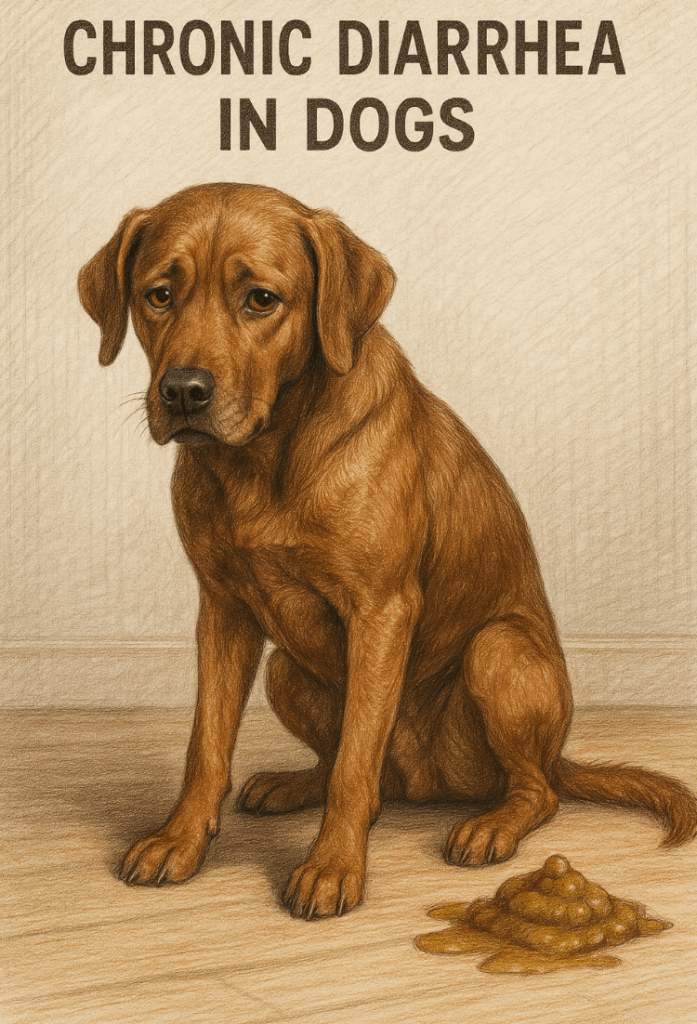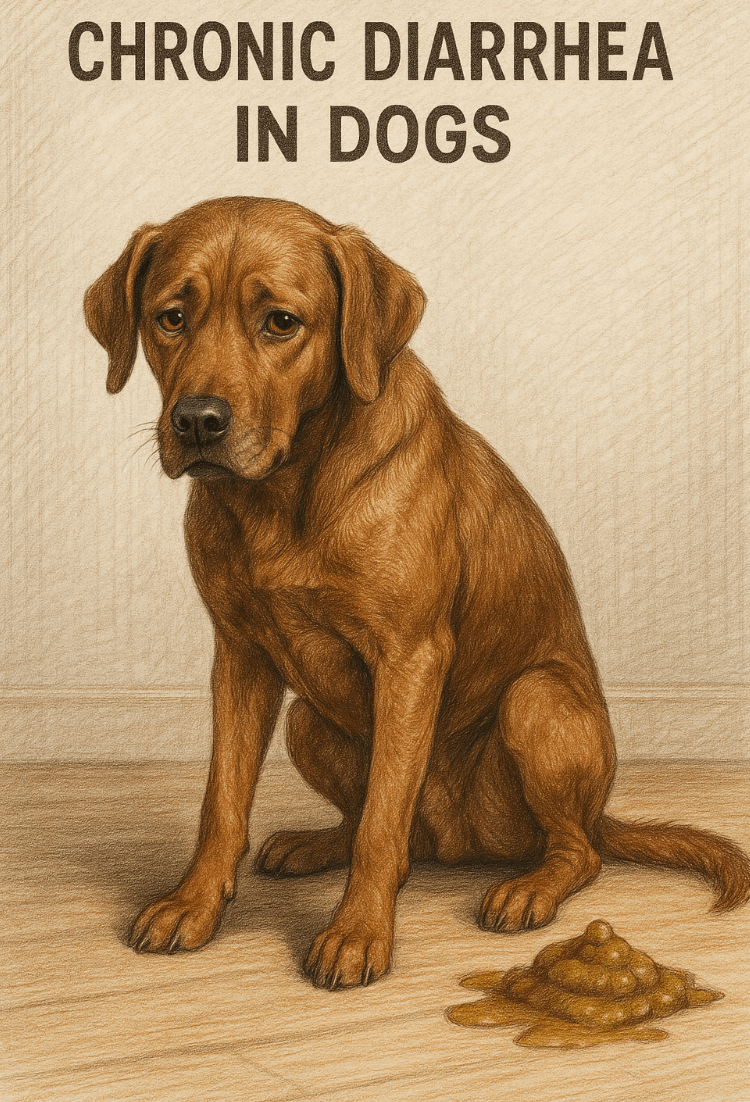Chronic Diarrhea in Dogs: Causes, Symptoms, and Solutions
Chronic diarrhea in dogs is a frustrating and concerning issue for pet owners. Unlike occasional loose stools, chronic diarrhea persists over weeks or even months, signaling an underlying health problem that requires attention. This condition can stem from dietary indiscretion, infections, allergies, or more serious medical conditions like gastrointestinal disorders.
As a responsible dog owner, understanding the potential causes, recognizing symptoms early, and knowing how to address them is crucial for your furry friend’s well-being. In this blog post, we’ll explore everything you need to know about managing and treating chronic diarrhea in dogs, ensuring they stay healthy and happy.
Common Causes of Chronic Diarrhea in Dogs
Identifying the root cause of chronic diarrhea is the first step toward effective treatment. Here are some of the most common culprits behind this persistent issue.
Dietary Changes or Sensitivities:
Sudden shifts in diet or food intolerances can upset your dog’s digestive system, leading to prolonged diarrhea.Parasites and Infections:
Intestinal parasites like giardia or worms, as well as bacterial or viral infections, can cause ongoing digestive distress.Food Allergies:
Many dogs develop allergies to specific ingredients, such as beef, chicken, or grains, triggering chronic gastrointestinal issues.Inflammatory Bowel Disease (IBD):
IBD is a chronic condition where the intestines become inflamed, often resulting in persistent diarrhea and weight loss.Underlying Medical Conditions:
Liver disease, kidney failure, pancreatitis, or hormonal imbalances may contribute to long-term digestive problems.
Understanding these causes helps guide diagnosis and treatment, ensuring your dog receives the care they need.
Signs and Symptoms to Watch For
Recognizing the signs of chronic diarrhea in dogs allows you to act quickly and seek veterinary advice when necessary. Look out for these key indicators.
Frequent Loose Stools:
Persistent soft or watery stools over several weeks are the hallmark of chronic diarrhea.Blood or Mucus in Stool:
The presence of blood or mucus signals irritation or damage in the digestive tract.Weight Loss:
Unexplained weight loss often accompanies chronic diarrhea due to malabsorption of nutrients.Lethargy and Weakness:
Dogs with chronic diarrhea may appear tired, weak, or less interested in their usual activities.Vomiting or Loss of Appetite:
These additional symptoms suggest a more severe underlying issue requiring immediate attention.
By staying vigilant and monitoring these signs, you can address chronic diarrhea before it leads to further complications.
Check this guide 👉Yellow Brown Diarrhea in Dogs: Best 7 Expert Tips!
Check this guide 👉Antibiotics for Dog Diarrhea: Best 7 Health Tips!
Check this guide 👉Why Is My Dog Having Diarrhea at Night? Best 7 Tips!

Possible Causes of Chronic Diarrhea | Recommended Actions |
|---|---|
Dietary changes or sensitivities | Gradually transition to a bland diet |
Parasites or infections | Visit the vet for fecal testing |
Food allergies | Conduct an elimination diet trial |
Inflammatory Bowel Disease (IBD) | Consult a vet for medication and diet |
Underlying medical conditions | Schedule comprehensive diagnostic tests |
Steps to Manage Chronic Diarrhea at Home
While professional veterinary care is essential, there are steps you can take at home to support your dog’s recovery and manage mild cases of chronic diarrhea.
Switch to a Bland Diet:
Offer easily digestible foods like boiled chicken and rice to soothe their stomach.Ensure Hydration:
Encourage your dog to drink plenty of water to prevent dehydration caused by diarrhea.Limit Treats and Table Scraps:
Avoid giving your dog extra snacks or human food, which can worsen digestive issues.Monitor Their Behavior:
Keep track of your dog’s stool consistency, appetite, and energy levels to share with your vet.Avoid Stressful Situations:
Minimize stressors like loud noises or changes in routine, as stress can exacerbate diarrhea.
These measures provide temporary relief but should not replace professional guidance for persistent cases.
When to Seek Veterinary Care for Your Dog
While some cases of diarrhea resolve on their own, chronic diarrhea often requires veterinary intervention. Knowing when to consult a professional ensures your dog receives timely treatment.
Diarrhea Lasting More Than 48 Hours:
If loose stools persist beyond two days, it’s time to see the vet.Severe Dehydration:
Signs include dry gums, sunken eyes, and lethargy—seek immediate care if observed.Blood in Stool:
Bright red or dark, tarry stools indicate internal bleeding and require urgent attention.Significant Weight Loss:
Rapid or unexplained weight loss suggests malnutrition or a serious underlying condition.Behavioral Changes:
If your dog becomes unusually withdrawn, aggressive, or disoriented, it could signal a deeper issue.
Prompt veterinary care prevents minor problems from escalating into life-threatening situations.
Preventive Measures to Avoid Chronic Diarrhea
Prevention is always better than cure when it comes to your dog’s digestive health. These proactive steps can reduce the risk of chronic diarrhea.
Maintain a Consistent Diet:
Avoid frequent changes in your dog’s food to prevent digestive upset.Provide Fresh Water Daily:
Clean, accessible water supports hydration and aids digestion.Schedule Regular Vet Check-Ups:
Routine exams help catch potential issues before they escalate.Keep Up with Parasite Prevention:
Use flea, tick, and worm prevention treatments to protect against intestinal parasites.Supervise Outdoor Activities:
Prevent your dog from eating garbage, plants, or other harmful substances during walks.
By adopting these habits, you can minimize the chances of chronic diarrhea affecting your dog.
The Role of Diet in Managing Chronic Diarrhea
Nutrition plays a critical role in managing chronic diarrhea, as certain foods can either worsen or alleviate symptoms. Consider these dietary tips for your dog.
Eliminate Common Allergens:
Remove ingredients like beef, dairy, or wheat from your dog’s diet to rule out allergies.Choose High-Quality Dog Food:
Opt for brands formulated for sensitive stomachs, containing easily digestible proteins and fibers.Incorporate Fiber-Rich Foods:
Pumpkin or sweet potato can regulate bowel movements and firm up loose stools.Introduce Probiotics Gradually:
Beneficial bacteria improve gut flora and enhance nutrient absorption.Avoid Overfeeding:
Feeding smaller, more frequent meals reduces strain on the digestive system.
A tailored diet can make a significant difference in managing chronic diarrhea effectively.
Alternative Therapies for Chronic Diarrhea in Dogs
In addition to conventional treatments, alternative therapies can complement your dog’s recovery plan. Explore these options under veterinary supervision.
Herbal Supplements:
Herbs like slippery elm or marshmallow root soothe irritated digestive tracts naturally.Acupuncture:
This traditional Chinese medicine technique may reduce inflammation and improve gut function.Hydrotherapy:
Gentle water exercises promote relaxation and reduce stress-related diarrhea.Essential Oils:
Diluted oils like ginger or peppermint can calm nausea and aid digestion when used safely.Behavioral Therapy:
Addressing anxiety through training or calming aids can indirectly improve digestive health.
These complementary approaches offer holistic solutions for managing chronic diarrhea in dogs.
Frequently Asked Questions About Chronic Diarrhea in Dogs
What should I feed my dog with chronic diarrhea?
Start with a bland diet of boiled chicken and rice, then gradually reintroduce regular food under veterinary guidance.
Can stress cause chronic diarrhea in dogs?
Yes, anxiety or environmental changes can trigger digestive issues; minimizing stress helps alleviate symptoms.
How is chronic diarrhea diagnosed?
Vets use fecal exams, blood tests, imaging, and sometimes biopsies to identify the underlying cause.
Are probiotics helpful for dogs with chronic diarrhea?
Probiotics can restore gut health and improve digestion, but consult your vet before starting any supplements.
Is chronic diarrhea curable?
Treatment depends on the cause—some conditions are manageable, while others may require lifelong care.
Taking Control of Chronic Diarrhea in Dogs
Chronic diarrhea in dogs is a complex issue that demands patience, observation, and collaboration with your veterinarian. By identifying triggers, implementing dietary adjustments, and addressing underlying health problems, you can restore your dog’s digestive health and overall well-being. Remember, early intervention is key to preventing complications and ensuring your furry companion enjoys a happy, active life. With the right care and attention, chronic diarrhea doesn’t have to be a permanent challenge for you or your beloved pet.
Do Cats Have Taste Buds? Best 7 Expert Tips! – Discover how cats experience flavors and why their taste is so unique.
Do Dogs Have Taste Buds? Best 7 Expert Tips! – Discover how dogs experience taste, their preferences, and what it means for their diet and health.
Can Cats Taste Sweet? Best 7 Expert Tips! – Discover why cats can’t taste sweetness, how it affects their diet, and tips to keep them healthy and happy.
Can Dogs Taste Sweet? Best 7 Expert Tips! – Discover how dogs perceive sweetness, which foods are safe, and tips to manage their sweet cravings responsibly.





